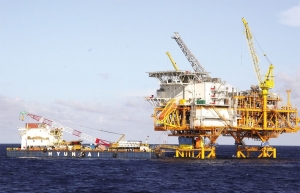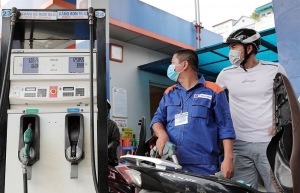Balancing the effects of global oil price fluctuations
The price of oil continues to concern many. Can you provide some forecasts for the next few months or beyond?
The world oil price has been on a downward trend recently. Prices have fallen more than 30 per cent from the most recent peak to about $87-93 per barrel but are high compared to previous years.
 |
| Luong Van Khoi, vice president of the National Centre for Socio-economic Information and Forecast |
The global oil price depends mainly on supply from OPEC, Russia, and Iran, as well as the growth prospects of major economies, geopolitical fluctuations, and currency price movements. Oil supplies are increasing, and the world’s major oil exporters have agreed to increase production to hold the rise in prices.
The gloomy global economic outlook pulls demand and prices down. Growth figures in the second quarter of 2022 show the risk of a global recession and slowdown in the US, Japanese, and Chinese economies. Central banks of major countries such as the United States and EU raising interest rates will also negatively affect economic growth and may cause global oil prices to drop. These factors show that prices are still likely to decrease from now to the end of the year.
However, these prices will be able to increase again by the end of 2024 for reasons such as demand increases in winter for heating, especially in Europe.
China is gradually easing epidemic control measures and will probably reopen the country to promote economic growth and trade, and increase demand. Supply-side growth is slowing around the world.
We can see that until the end of the year, there are factors that will pull the world oil price down, and there are also factors that will push it up. However, I think it can remain at the current level or increase slightly at the end of the year.
By 2023, oil prices are forecast to decrease compared to this year but still remain high as demand recovers after lifting epidemic control measures.
How can the volatility of global oil prices impact costs domestically?
Domestic petrol prices will fluctuate according to world oil prices. The regulators in Vietnam will adjust the petrol price on the first, 11th, and 21st of each month, if necessary.
According to the provisions of Decree No.95/2021/ND-CP from last year, the base price of petrol is calculated using taxes, global petroleum prices, normative expenses and profits, and spending on the petroleum price stabilisation fund.
In the first eight months, the domestic petrol price was raised 12 times and peaked at the end of June at nearly VND33,000 ($1.40) per litre. Since then, the price has decreased five times to hit VND24,660 ($1.10) per litre.
After the price management period in early September, kerosene and diesel prices increased strongly, enabling them to exceed domestic petrol prices for the first time ever. The increase in diesel prices is caused by European countries preferring diesel to replace Russian gas.
The US is exporting more diesel to Europe, but it is difficult to raise the supply. These are some of the reasons why oil prices are higher than petrol.
Since the beginning of the year, oil prices have been adjusted 23 times, including 15 increases and eight decreases. The price of diesel and kerosene has soared by about VND7,000 (30 US cents) per litre compared to the beginning of the year, up 38.12 per cent, while petrol fell to the same level in January.
What policies are the government providing to balance the impact of oil prices and curb inflation?
Stabilising the macro economy, controlling inflation, and ensuring large balances comprise potential risks and challenges. Prices of petrol, food, steel, and fertiliser worldwide are decreasing, but it is difficult to forecast.
The shortages, supply disruptions, rising global production, and transportation costs are putting a lot of pressure on inflation and domestic commodity prices.
The upward trend of inflation has continued, and increasing raw material and energy prices globally are expected to continue in the near future. This is mainly due to factors such as raw material price hikes; price increase pressure from Vietnam’s socioeconomic recovery; tourism demand; and epidemics and natural disasters.
In addition, due to the lag of fiscal and monetary policy, with the above pressures, inflation will not only increase in 2022 but continue in 2023 if there are no solutions to curb it soon.
To reduce inflationary pressure due to the oil price, it is necessary to calculate the room to further reduce taxes and fees in the current retail price of petrol, consider reducing VAT on petroleum products until the end of 2022, and/or reduce excise tax and import tax on petroleum as in other countries.
In addition, it is necessary to strengthen control of market prices, require businesses to publicise and be transparent on prices, and have sanctions to prevent consumer goods from increasing unreasonably.
We should also find long-term solutions to ensure the supply of petroleum (both domestic and imported), regulate the distribution system, and avoid supply disruptions that affect people’s lives and production.
The government should combine monetary, fiscal, and price control policies to minimise the impact on inflation when implementing the economic recovery programme.
 | Oil and gas sector counting on vital new investment cycle As oil prices anchor around $90-100 per barrel globally, changes in the oil and gas policy of many markets are expected to bring a new cycle of investment to Vietnam – with the government also taking steps to transition to renewable energy sources by cooperating with countries around the world. |
 | Vietnamese oil facing significant hurdles The government is promoting energy self-reliance rapidly as global developments have significantly changed the world’s energy situation, pushing Europe into gas scarcity for this winter. |
 | Strategies considered to cope with oil shifts As there is no silver lining ahead just yet when it comes to stabilised oil prices, economists and associations agree that corporate taxes should be reduced and oil reserves built to help cope with the current dilemma, but both of these solutions would be costly. |
What the stars mean:
★ Poor ★ ★ Promising ★★★ Good ★★★★ Very good ★★★★★ Exceptional
Related Contents
Latest News
More News
- Masan Consumer names new deputy CEO to drive foods and beverages growth (February 23, 2026 | 20:52)
- Myriad risks ahead, but ones Vietnam can confront (February 20, 2026 | 15:02)
- Vietnam making the leap into AI and semiconductors (February 20, 2026 | 09:37)
- Funding must be activated for semiconductor success (February 20, 2026 | 09:20)
- Resilience as new benchmark for smarter infrastructure (February 19, 2026 | 20:35)
- A golden time to shine within ASEAN (February 19, 2026 | 20:22)
- Vietnam’s pivotal year for advancing sustainability (February 19, 2026 | 08:44)
- Strengthening the core role of industry and trade (February 19, 2026 | 08:35)
- Future orientations for healthcare improvements (February 19, 2026 | 08:29)
- Infrastructure orientations suitable for a new chapter (February 19, 2026 | 08:15)

 Tag:
Tag:



















 Mobile Version
Mobile Version